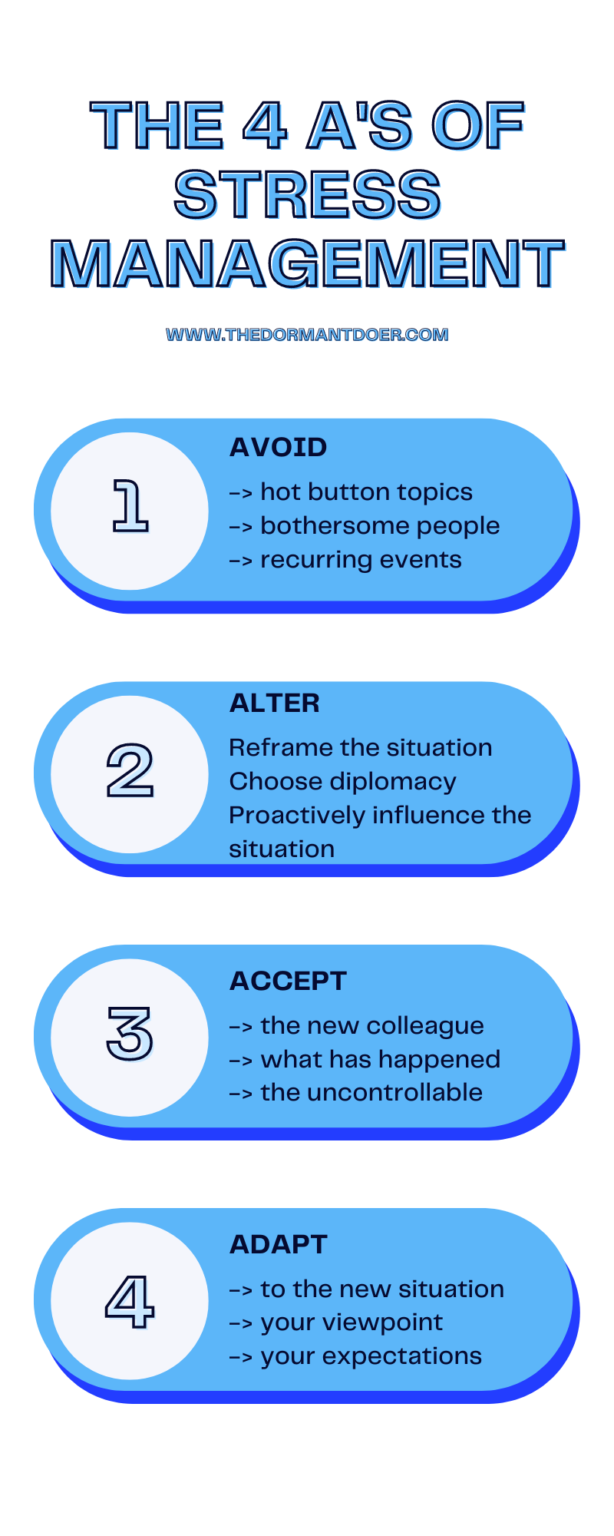The 4 A's of Stress Management
Have you ever wondered how politicians manage to be our country’s leaders, overseeing 2 companies and having a decent amount of time for their loved ones at the same time? A critical ability to do all of that is professional stress management. Each A stands for a transformative power, inviting us to embrace a new perspective and empowering us to navigate through challenges with grace and resilience.

Avoid
Hot button topics
What do politics, religion and genderism have in common? These are subjects that polarize and everybody has an opinion to it. Theoretically you could argue with somebody everyday about it. Unfortunately, this takes a lot of time and energy and is in most cases without any value. Avoiding hot button topics easily prevents you from unnecessary stress.
Bothersome people
”You can’t choose family” is the classic quote you get told, when elaborating on major issues with family members. The good news is, that there are plenty of reasons and possibilities to avoid contact with any kind of bothersome people. The least you can do is minimizing time spending with people who are not aligned to your values or show toxic behavior.
Recurring events
Sometimes friends and I share reasons we love about getting old. One major benefit is wisdom. Wisdom includes the ability of recognizing events and patterns that just suck life energy out of you. These recurring events can be:
→ Christmas shopping shortly before Christmas
→ Leaving no space for errors in life
→ saying yes to everybody

Alter
Reframe the situation
Often we can’t avoid a situation. In these cases we gotta be flexible and reframe how we think about it. Reframing is a powerful tool, which many psychological therapists make use of. It means challenging a viewpoint of yours and alter your perception about it. Examples are:
Somebody pulls you out of focus through a conversation. Instead of becoming annoyed, you use the time for a quick hydration, walking and toilet break. When you come back you let the person know that you have to continue your work now.
The restaurant you wanted to go is closed. Instead of going back home, be flexible, do a quick research and try a new restaurant nearby.
You experience a setback. Instead of asking “why me again?” be grateful and see this situation as preparation for the bigger challenges ahead of you.
If used right, reframing is a incredibly powerful technique, to avoid creating stress.
Choose diplomacy
J.F. Kennedy said “Let us never negotiate out of fear, but let us never fear to negotiate.” The middle way is highly underestimated. Fortunately it’s not always black and white. You have the power to negotiate a situation that is fine for both of you. So instead of demanding
-> more money from your boss, find out what is important for them and negotiate a deal that fits both of your needs
-> the opposite to meet your expectations, investigate their desires and create a situation that accommodates both of you
-> final results right now, suggest progressive results
Proactively influence the situation
My favorite point of the 4 A’s. You won’t believe how reactive the world is. Due many reasons, most people don’t see the benefit of being the first that
→ starts the conversation
→ provides a solution
→ resolves a conflict
→ communicates a viewpoint effectively
→ forgives
The opportunities of a proactive lifestyle are endless and offer huge potential avoiding and resolving stress.

Accept
The new colleague
The mother enters the courtroom. Defeated, but full of courage and confidence she takes a seat next to her attorney in front of the judge. Today she will face the murder of her son. Instead of doing what everybody expects, she holds a memorable speech and concludes that this is not what they are. She cannot hate. She cannot take revenge. Instead she walks up to her sons murder and embraces him tightly. If you are interested, you can watch the video here Mom Comes Face-To-Face With Her Son’s Killer In Court | Humankind – YouTube
The divine power of accepting and forgiving enables you a lifestyle in calmness and tranquility. Too often we carry the past on our shoulders without resolving it. It’s simple, but not easy. Learning to accept what has happened is a life’s challenge, that scares most of us. But is it worth it? You probably know the answer already.
The uncontrollable
Embracing life’s unpredictable nature is an acknowledgement that some aspects of our existence lie beyond our control. In this recognition we find liberation, as we release the burden of trying to manipulate every outcome. Instead, we focus on nurturing our inner strength and adapting to whatever circumstances arise. By accepting the uncontrollable, we cultivate a sense of surrender and trust in the universe’s greater plan. We learn to flow with the currents of life, finding peace in the midst of uncertainty and allowing ourselves to grow in unexpected ways.

Adapt
To the new situation
If nothing of the above-mentioned ideas, concepts and ideas work out, adapting to the new situation is the last way out. You may be surprised how often the adaption to a new situation brings unexpected joy and fulfillment. Once I missed my flight from Sri Lanka to Australia. Standing at the airport, noticing that a new ticket was double the price as when I obtained it left me in shock. After 15 minutes of rage (it was not that severe haha) I pivoted and bought the way cheaper ticket to Indonesia, which was probably the best decision on this trip. There lies incredible opportunity when we have to adapt to a new situation.
Your viewpoint
This can be a tricky one, since very often beliefs are connected to our identity. By nature, we associate the adaptation of our viewpoints with death. Our Stoneage brain didn’t evolve that quickly to easily redefine beliefs. However, in this fast-paced world it’s not only necessary to untangle viewpoints from our identity. No, we are almost coerced to regularly redefine and adapt many of our viewpoints to a new reality.
Your expectations
“My expectations were reduced to zero when I was 21. Everything since then has been a bonus.” With these words Stephen Hawking lived on his life after the shocking diagnose of Amyotrophic Lateral Sclerosis (ALS). Despite being a huge role model in the scientific world, Stephen lived a remarkable life with the least amount of expectations. Putting your expectations below zero enables you to easily adapt to a future you may not see coming.

